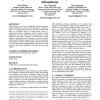469 search results - page 62 / 94 » Self-adaptation for everyday systems |
ACMDIS
2006
ACM
13 years 11 months ago
2006
ACM
Randomness is being harnessed in the design of some interactive systems. This is observed in random blogs, random web searching, and in particular Apple's iPod Shuffle. Yet t...
FPLAY
2008
13 years 9 months ago
2008
Conflict theory can be used to explain the interactions between societies during times of turmoil and change (i.e. revolutions, strikes or everyday debates). Games have been produ...
IJCAI
2007
13 years 9 months ago
2007
Most existing sketch understanding systems require a closed domain to achieve recognition. This paper describes an incremental learning technique for opendomain recognition. Our s...
DGO
2003
13 years 9 months ago
2003
Federal agencies implement laws passed by the Congress by creating rules and regulations that can be applied in practice. During this process, staffs at the various agencies may r...
USENIX
2001
13 years 9 months ago
2001
We desired a platform for researching advanced window layout paradigms including the use of constraints. Typical window management systems are written entirely in C or C++, compli...

